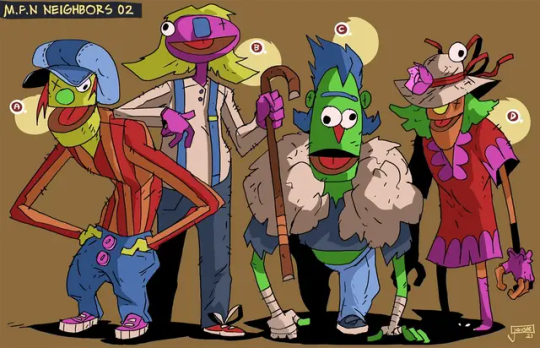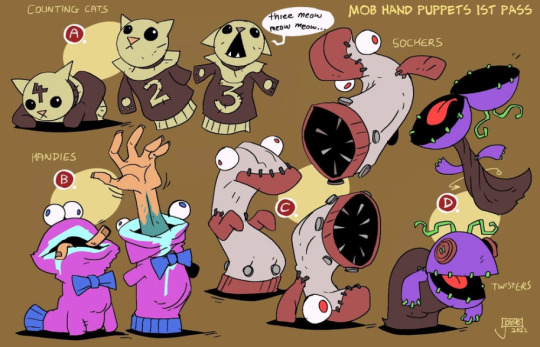#mfn theory
Text
HEY


THIS SECRET MESSAGE WAS FROM/DIRECTED TO SOMEONE NAMED JOHN, RIGHT?


Gordon J. O’Brian
Gordon John O’Brian
That’s why Gordon keeps having little moments where it seems he knows more than he should - he’s been here before.
(Well either that or it’s his supervisor but I doubt it)
335 notes
·
View notes
Text
Okay so I played My Friendly Neighborhood about a week or two ago as of now (loved the game). Anyway then I watched Sean's playthrough and he made a comment about Gordon's arms, specifically how skinny they are.. especially for his work of maintenance, which got me thinking and I hate what my brain came up with.. I think Gordon could have some kind of eating disorder, or just doesn't eat enough, either way is bad. The man obviously has past trauma, probably survivor guilt (from the war), and on top of that when he got back, was promptly called a murderer. Now I'm leaning towards an eating disorder myself on this, but I hate it..
Anyway, I like the idea of the puppets noticing this and promptly trying to get the man to eat.
68 notes
·
View notes
Text
The thought that maybe the reson the unfriendly neighborhood puppets have no eyes is that they clawed them off out if desperation to stop witnessing the horrors of the war/whatever movie they saw that messed them up like that
15 notes
·
View notes
Text
hello mfn fandom i found concept art to feed u all

George before he went bald

who is the green dude, also Lilliana i think u may need a doctor

WHO ARE YOU PEOPLE

SHE USED TO HAVE BABY WINGS!! I LIKE THE BABY WINGS!

GOOBER

I LOVE THESE MORE THAN THE HANDPUPPETS WE GOT!! (No offense to Handy, Randy, or pig) I wish we could of gotten Handy Randy and Pig as well as these guys!!

believe it or not these are all Ricky concept arts (other than the one that kinda looks like Pearl??)

RAY FULL BODY REVEAL
Ok so this is an odd theory but


some of these unused guys look awfully familar to me.
#mfn#my friendly neighborhood horror game#my friendly neighborhood#my friendly neighborhood ricky#mfn gordon#mfn leonard#mfn junebug#norman mfn#mfn norman#mfn ricky#mfn game#puppets
485 notes
·
View notes
Text
How monopoly enshittified Amazon

In Bezos’s original plan, the company called “Amazon” was called “Relentless,” due to its ambition to be “Earth’s most customer-centric company.” Today, Amazon is an enshittified endless scroll of paid results, where winning depends on ad budgets, not quality.
Writing in Jeff Bezos’s newspaper The Washington Post, veteran tech reporter Geoffrey Fowler reports on the state of his boss’s “relentless” commitment to customer service. The state is grim.
https://www.washingtonpost.com/technology/interactive/2022/amazon-shopping-ads/
Search Amazon for “cat beds” and the entire first screen is ads. One of them is an ad for a dog carrier, which Amazon itself manufactures and sells, competing with the other sellers who bought that placement.
Scroll down one screen and you get some “organic” results — that is, results that represent Amazon’s best guess at the best products for your query. Scroll once more and yup, another entire screen of ads, these ones labeled “Highly rated.” One more scroll, and another screenful of ads, one for a dog product.
Keep scrolling, you’ll keep seeing ads, including ads you’ve already scrolled past. “On these first five screens, more than 50 percent of the space was dedicated to ads and Amazon touting its own products.” Amazon is a cesspit of ads: twice as many as Target, four times as many as Walmart.
How did we get here? We always knew that Amazon didn’t care about its suppliers, but being an Amazon customer has historically been a great deal — lots of selection, low prices, and a generous returns policy. How could “Earth’s most customer-centric” company become such a bad place to shop?
The answer is in Amazon’s $31b “ad” business. Amazon touts this widely, and analysts repeat it without any critical interrogation, proclaiming that Amazon is catching up with the Googbook ad-tech duopoly. But nearly all of that “ad” business isn’t ads at all — it’s payola.
https://pluralistic.net/2022/02/27/not-an-ad/#shakedowns
Amazon charges its sellers billions of dollars a year through a gladiatorial combat where they compete to outspend each other to see who’ll get to the top of the search results. May the most margin-immolating, deep-pocketed spender win!
Why would sellers be willing to light billions of dollars on fire to get to the top of the Amazon search results?
Prime.
Most of us have Amazon Prime. Seriously — 82% of American households! Prime users only shop on Amazon. Seriously. More than 90% of Prime members start their search on Amazon, and if they find what they’re looking for, they stop there, too.
If you are a seller, you have to be on Amazon, otherwise no one will find your stuff and that means they won’t buy it. This is called a monopsony, the obscure inverse of monopoly, where a buyer has power over sellers.
But monopoly and monopsony are closely related phenomena. Monopsonies use control over buyers — the fact that we all have Prime — to exert control over sellers. This lets them force unfavorable terms onto sellers, like deeper discounts. In theory, this is good for use consumers, because prices go down. In practice, though…
Back in June 2021, DC Attorney General Karl Racine filed an antitrust suit against Amazon, because the company had used its monopoly over customers to force such unfavorable terms on sellers that prices were being driven up everywhere, not just on Amazon:
https://pluralistic.net/2021/06/01/you-are-here/#prime-facie
Here’s how that works: one of the unfavorable terms Amazon forces on sellers is “most favored nation” status (MFN), which means that Amazon sellers have to offer their lowest price on Amazon — they can’t sell more cheaply anywhere else.
Then Amazon hits sellers with fees. Lots of fees:
Fees to be listed on Prime (without which, your search result is buried at the bottom of an endless scroll):
Fees for Amazon warehouse fulfillment (without which, your search result is buried at the bottom of an endless scroll)
And finally, there’s payola — the “ads” you have to buy to outcompete the other people who are buying ads to outcompete you.
All told, these fees add up to 45% of the price you pay Amazon — sometimes more. Companies just don’t have 45% margins, because they exist in competitive markets. If I’m selling a bottle of detergent at a 45% markup, my rival will sell it at 40%, and then I have to drop to 35%, and so on.
But everyone has to sell on Amazon, and Amazon takes their 45% cut, which means that all these sellers have to raise prices. And, thanks to MFN, the sellers then have to charge the same price at Walmart, Target, and your local mom-and-pop shop.
Amazon’s monopoly (control over buyers) gives it a monopsony (control over sellers), which lets it raise prices everywhere, at Amazon and at every other retailer, even as it drives the companies that supply it into bankruptcy.
Amazon is no longer a place where a scrappy independent seller can find an audience for its products. In order to navigate the minefield Amazon lays for its sellers (who have no choice but to sell there), these indie companies are forced to sell out to gators (aggregators), which are now multi-billion-dollar businesses in their own right:
https://pluralistic.net/2022/02/10/monopoly-begets-monopoly/#gator-ade
This brings me back to the enshittification of Amazon search, AKA late-stage (platform) capitalism. Amazon’s dominance means that many products are now solely available on the platform. With the collapse of both physical and online retail, Prime isn’t so much a choice as a necessity.
Amazon has produced a planned economy run as capriciously as a Soviet smelting plant, but Party Secretary Bezos doesn’t even pretend to be a servant of the people. From his lordly seat aboard his penis-rocket, Bezos decides which products live and which ones die.
Remember that one of those search-results for a cat-bed was a product for dogs? Remember that Amazon made that dog product? How did that end up there? Well, if you’re a seller trying to make a living from cat-beds, your ad-spending is limited by your profit margin. Guess how much it costs Amazon to advertise on Amazon? Amazon is playing with its own chips, and it can always outbid the other players at the table.
Those Amazon own-brand products? They didn’t come out of a vacuum. Amazon monitors its own sellers’ performance, and creams off the best of them, cloning them and then putting its knockoffs above of the original product in search results (Bezos lied to Congress about this, then admitted it was true):
https://nypost.com/2021/10/18/jeff-bezos-may-have-lied-to-congress-about-amazon-practices-reps/
If you’ve read Chokepoint Capitalism, Rebecca Giblin’s and my new book about market concentration in the entertainment industry, this story will be a familiar one. You’ll recall that Amazon actually boasts about this process, calling it “the flywheel”:
https://twitter.com/rgibli/status/1561761732108107777
Everything that Amazon is doing to platform sellers, other platforms are doing to creators. You know how Amazon knocks off its sellers’ best products and then replaces them with its clones? That’s exactly what Spotify does to the ambient artists in its most popular playlists, replacing them with work-for-hire soundalikes who aren’t entitled to royalties.
You can learn more about how Spotify rips off its performers in the Chokepoint Capitalism chapter on Spotify; we made the audiobook version of that chapter a Spotify exclusive (it’s the only part of the book you can get on Spotify):
https://pluralistic.net/2022/09/12/streaming-doesnt-pay/#stunt-publishing
Entertainment and tech companies all want to be the only game in town for their creative labor force, because that lets them turn the screws to those workers, moving value from labor to shareholders.
Amazon is also the poster-child for this dynamic. For example, its Audible audiobook monopoly means that audiobook creators must sell on Audible, even though the #AudibleGate scandal revealed that the company has stolen hundreds of millions of dollars from these creators. (Our chapter on Audiblegate is the only part of our audiobook on Audible!)
https://pluralistic.net/2022/09/07/audible-exclusive/#audiblegate
Then there’s its Twitch division, where the company just admitted that it had been secretly paying its A-listers 70% of the total take for their streams. The company declared this to be unfair when the plebs were having half their wages clawed back by Amazon, so they fixed it by cutting the A-listers’ pay.
https://pluralistic.net/2022/09/22/amazon-vs-amazon/#pray-i-dont-alter-it-further
Twitch blamed the cut on the high cost of bandwidth for streaming. If that sounds reasonable to you, remember: Twitch buys its bandwidth from Amazon. As Sam Biddle wrote, “Amazon is charging Amazon so much money to run the business via Amazon that it has no choice but to take more money from streamers.”
https://twitter.com/samfbiddle/status/1572667269284777984
As Bezos suns himself aboard his yacht-so-big-it-has-a-smaller-yacht, we ask him to referee a game where he also owns one of the teams. Over and over again, he proves that he is not up to the task. Either his “relentless” customer focus was a sham, or the benefits of cheating are too tempting to ignore.
Historically, we understood that businesses couldn’t be trusted to be on both sides of a transaction. The “structural separation” doctrine is one of the vital pieces of policy we’ve lost over 40 years of antitrust neglect. It says that important platforms can’t compete with their users.
https://locusmag.com/2022/03/cory-doctorow-vertically-challenged/
For example, banks couldn’t own businesses that competed with their commercial borrowers. If you own Joe’s Pizza and your competitor is Citibank Pizza and you both have a hard month and can’t make your payment, will you trust that Citi called in your loan but not Citibank Pizza’s because they had a more promising business?
Today, all kinds of businesses have been credibly accused of self-preferencing: Google and Apple via their App Stores, Spotify via its playlists, consoles via their game stores, etc. Legislators have decided that the best way to fix this isn’t structural separation, but rather, rules against self-preferencing.
Under these rules, companies will have to put “the best” results at the top of their listings. This is doomed. When Apple says it put its own ebook store ahead of Bookshop.org’s app because it sincerely believes Apple Books is “better,” how will we argue with this? Maybe Apple really does believe that. Maybe it doesn’t. Maybe it does, but only because of motivated reasoning (“It is difficult to get a product manager to understand something, when their bonus depends on them not understanding it”).
The irony here is that these companies’ own lawyers know that a sincere promise of fairness is no assurance that your counterparty will act honorably. If the judge in Apple v. Epic was a major shareholder in Epic, or the brother-in-law of Epic’s CEO, Apple’s lawyers would bring down the roof demanding a new judge — even if the judge promised really sincerely to be neutral.
https://marker.medium.com/moral-hazard-and-monopoly-42e30eb159a8
Ultimately, it doesn’t matter if Amazon’s enshittification is because Bezos was a cynic or because he sold out. Once Amazon could make more money by screwing its customers, that screw-job became a fait accompli. That’s why it’s so important that the FTC win its bid to block the Activision-Microsoft merger:
https://www.politico.com/news/2022/11/23/exclusive-feds-likely-to-challenge-microsofts-69-billion-activision-takeover-00070787
The best time to prevent monopoly formation was 40 years ago. The second best time is now.
Anti-monopoly measures are slow and ponderous tools, but when it comes to tech companies, we have faster, more nimble ones. If we want to make it easy to compete with Amazon, we could — for example — use Adversarial Interoperability to turn it into a dumb pipe:
https://pluralistic.net/2022/08/01/dumb-pipes/#original-asin
That is, we could let local merchants use Amazon’s ASIN system to tag their own inventory and produce a realtime database. Customers could browse Amazon to find the things they wanted, with a browser plugin that turned “Buy It Now” into “Buy It Now at Joe’s Hardware”:
https://doctorow.medium.com/view-a-sku-32721d623aee
But this only works to the extent that Amazon’s search isn’t totally enshittified. To that end, Fowler has a few modest proposals of his own, like requiring that at least 50% of the first six screens be given over to real results, not ads.
“Perhaps 50 percent sounds like a lot to you? But even that rule would force Amazon to show us at least some of the most-relevant results on the first screen of our device…Amazon wouldn’t comment on this suggestion.”
2K notes
·
View notes
Text
My thoughts on the “very slow” Miles Morales writing community. Don’t come at me it’s an OPINION! and for CONVERSATIONAL PURPOSES! so comment tell me if you agree or not 😌
There is little to no conversation about Miles. I’ve noticed in the Hobie community they share their thoughts and constantly talk about him and that keeps the community alive and encourages people to join in on the conversation and interact ect…. There’s few blogs now sharing anything about Miles, their thoughts, theory’s, anything adding to the conversation. (I’m not gonna stand on this too much, there are accounts dedicated to talking about Miles and ATSV. But I don’t see much “writers” post about him)
Like with everything the hype died :( the movie came out 7 months ago and like with everything people lost interest and they’re onto the next. We’re constantly being fed new things and searching for new thing that feeds our brain cells and I guess it doesn’t for most people anymore (including me, don’t get me wrong I love Miles and ATSV forever but I’m not enthusiastic as I was because of other reasons.)
The content is limiting. The stories that you’re allowed as a writer to write about Miles is limiting (I’ve been saying this) 👀 I get it everyone loves fluff, fluff is safe but it’s only so much fluff you can make before you run out of ideas and the content gets stale and repetitive.
There’s too much “ranting” I get it, it’s public and y’all can post what you want but we really don’t care and it’s not necessary, it’s a huge turn off for people wanting to join the community if you’re just gonna complain and add nothing but your overwhelming negativity vibes.
It’s a really argumentative/hostile/toxic community (I’ve definitely contributed to that.) it’s a lot of back and forth between people a lot of hateful anon bs, “calling out” like relax btch, stop immediately . People are not on tumblr for that and to be harassed, and it’s definitely a turn off and stupid. Block and have a hood mfn day. It’s really that simple and I encourage you all to do it because you cannot control others.
#miles morales x reader#miles morales#miles morales x fem!reader#miles morales x gn reader#miles morales x black reader#miles 1610#earth 1610 miles morales#atsv#accrossthespiderverse#accross the spiderverse#earth 42 miles morales fic#earth 42 miles morales#earth 42 miles#prowler miles#btsv#itsv#miles g#miles g morales#miles morales x black!reader#miles morales x you#miles morales x y/n#miles morales headcanons#miles morales imagine#miles morales spiderverse#miles morales fic#miles morales fanfiction#earth 42 miles morales x black!reader#black writers#atsv miles morales#miles morales across the spiderverse
39 notes
·
View notes
Text
every time im watching a video related to mfn, without fail, theres someone in the comments sharing their theory that the puppets are possessed by dead staff members or kids DID YOU PLAY THE GAME AT ALL?
43 notes
·
View notes
Note
I have a bit of a theory to chew your brain matter upon based off your amazing art for MFN.
Whoever Gordon’s boss is, they wanted Gordon to mess up the job or leave without doing the job.
Obviously people knew the puppets were nutty due to the Ray Clothes Iron incident and with such an unfriendly city, why wouldn’t their boss seek a way to dispose of their most frustrating handyman without paying him his final paycheck and simply getting rid of him by having him fail his job.
MMmmMmM yessssss new theory to chew me brain matter mmmMmmM yessss I am pleased with the LOREEEEEEE
Ok but in all seriousness, this makes sense. The Age Discrimination act of 1967 states that you cannot dismiss someone purely on age, as that is the only reason why I think his old boss might’ve wanted him fired.
Boss man wanted to replace someone younger, maybe for efficiency reasons, but he couldn’t fire him without cause just because Gordon was old. So, boss man came up with a plan to make him fail on his job so that they can get rid of him quicker.
Jokes on boss man tho, Gordon is now the owner of the property 😭
#my friendly neighborhood#mfn gordon#my friendly neighborhood game#now#whether or not Gordon legally owns the studio is another day
44 notes
·
View notes
Note
I just had a silly idea.
Imagine entering Phantom's changin room and finding plenty of embarassing things. Like pictures of him in ridiculous outfits and newspaper articles with not so flattering photos about how funny it was when he lost his voice.
And of course a calendar dedicated to Peach, obviously.
If there will be his room in the DLC he'll be guarding it with all his might, lol.
This was actually the one place I desperately hope is in the DLC, more so than a possible horror movie set!
(it's a bit of a loooong post, so bare with me!)
In fact, I'm so glad you sent me this, Random, because I was going to talk about it on a whole separate post after watching the entirety of Jacksepticeye's My Friendly Neighborhood gameplay. However that was for his own office, not a dressing room.
Without revealing too much spoilers, there's a section in the game where you venture all throughout the MFN Theatre as a part of the main objective. I like to think if Phantom is the mastermind behind his network, then he would absolutely have an office like this.



Sean (Jacksepticeye) even mentioned how much it resembles the game, BioShock, what with its classic 30's-40's Silver Screen design.
Within his office would be his own dressing room, which would probably be like a luxurious hotel room considering how massive it would be. Inside the dressing room would be a treasure trove of, in the words of Game Theory, LOOOOOORE!!!!
Before Sparks of Hope, Phantom didn't have much in terms of depth with his character. Yes, we know he's egotistical and lives for theatre, but what about his interests? His reaction towards fans inside and outside the stage? His past relationships? His story of how he got his own network show? @color-cacophony mentioned lore murals for Phantom, so perhaps we'll see that or something similar in his dressing room. Not to mention the LOADS of Easter eggs you could put in such an area!
Can you imagine rummaging through his vanity set and coming across written lyrics to an unfinished song or a love poem dedicated to his golden-haired princess?
There's just so much I wanna know about Phantom ever since the sequel came out. Regardless of what is made canon or not, all I want is to enjoy that sweet, sweet lore...
9 notes
·
View notes
Text
Hey MFN Fandom I have a debacle:
Are the puppets the size of adults, or are they slightly taller than kids and Gordon’s just short?
#mfn#my friendly neighborhood horror game#my friendly neighborhood#mfn gordon#mfn junebug#mfn lenard#mfn ricky#mfn arnold#mfn norman#mfn spoilers#mfn game#mfn theory
57 notes
·
View notes
Text
I remember one time someone called my mom’s landline and it was the wrong number but we ended up talking for about an hour because I had he said I had a nice voice and out look on things. I was like 16 talking to a mfn stranger on the phone about random life theories for an hour. Lol, GOOD TIMES….
#blktumblr#black tumblr#blackgirlthoughts#black girl magic#90s baby#quotes#real talk#self love#black women#note to self#early 2000s#teenagers#nostaliga#random thoughts
2 notes
·
View notes
Text
My Friendly Neighbourhood Theories
A new game coming out is My Friendly Neighbourhood. I saw it on SuperHorrorBro.
Very unusual looking! Awesome.
It's about a Engineer called Gordon, who goes to fix the antennae on the roof of a abandoned studio.
My Friendly Neighbourhood was a Sesame Street like show with puppets.
And it has living puppets. That aren't unusual. And they used to have tours there.
And it screams theories.
So here goes!
The Puppets Are Robots
SuperHorrorBro Mike said this in a video. He's probabely right.
They're robots with learning AI. They were entirely friendly. And still are. But they killed and hurt by accident because they were too enthusiastic. And very strong.
They weren't allowed near the children under 20ft.
They say wierd and off things. But they seem more sad and lonely than anything else. They're trying to hug Gordan.
They've gone insane from being alone.
The swinging back and forth is sad. As is the Norman banging his head on a bookshelf.
They're smart and learn. Ray got sent downstairs because he caused trouble. He also got into a fuse box.
Ray is also the only one who's aggressive.
They had personalities programmed in. And Ray was a grumpy repairmen. But the others weren't aggressive. So they don't go over the programming.
They are robots made to entertain and they haven't seen people for so long.
Maybe the AI was faulty and some safety procedures were not done. It's obviously very smart AI. But it might have flaws.
Puppets Are Not Unusual
Gordan is not remotely bothered by them being Puppets. He's not surprised. Just annoyed.
That means they're commonplace. The Puppets without Puppeteers are common.
The unusual part is their behaviours and the show and studio shutting down.
He also doesn't bat a eyelid at the gun made of typewriter keys.
Advanced In Some Ways
So it's a world were they have living puppets.
Possibley robots.
But they also still use typewriters. Not computers. Not word processors.
Typewriters.
They print out Key Cards to use machinery. Their technology is early in the computer progress. Computers used to use cards to run. They printed them out.
Maybe the MFN building has been locked up for years. And their technology is behind. Maybe outside they have computers now.
But at the time it was open. They had computers which used key cards. And living puppets. And used typewriters.
3 notes
·
View notes
Note
Psst
💖
Here you go!
Have a good day!
Sorry for the late response! I literally don't know how to reply to this!!! I'll try though haha. I'm so surprised and happy thank you so much 😭❤️! I love your art, theories and thoughts for both WH and MFN so much! I look forward to seeing more!
0 notes
Note
More theory anon here. I’m having a baaaad feeling about smthn. If faebur says he’d like to kill the person who kidnapped Tommy… and Phil kidnapped Tommy… and Phil also was bothering the reader, someone he considers to “be his…” then shit is boutta hit the mfn FAN
mmmmmmmm love miscommunication because YES shit is going to hit the fan
also listen. tommy got into the car himself and you can bet phil tried to throw him out several times before they made it to his shop, thats all tommy's doing
1 note
·
View note
Text
Me reading the "Water Gardens" and all the other dark!Dany + Mad Queen Dany bullshit theories

#some really mfn off the wall theories#they REALLY do not understand Dany's character#this is probably from the same people who think she and Arya are psychopaths or sociopaths
5 notes
·
View notes
Text
The antitrust case against gig companies

Gig work companies like Uber and Doordash are committed to misclassifying their workers as contractors, which lets them escape employer obligations like a minimum wage, health care or worker’s comp (driving for Uber/Lyft is one of the most dangerous jobs in America).
These companies spent $225m to pass California’s Proposition 22, a ballot initiative that formalized worker misclassification, paving the way for all kinds of companies to convert employees to contractors at the stroke of a pen:
https://pluralistic.net/2021/01/05/manorialism-feudalism-cycle/#prop22
Hilariously, all that money was wasted. Prop 22 was unconstitutional (it usurped the California Assembly’s constitutionally mandated duty to establish universal worker’s comp), and it was (idiotically) drafted such that if any clause was struck the whole thing would go out the window:
https://www.latimes.com/california/newsletter/2021-08-23/proposition-22-lyft-uber-decision-essential-california
But they’ll try again — they already are, in Massachusetts, where the same companies have already poured $100m into “the East Coast’s Prop 22”:
https://www.protocol.com/policy/gig-work-prop-22-fight-massachusetts
As venture capital ghoul Shawn Carolan bragged after Prop 22 passed, the point is to create a future in which all labor rights — for nurses, teachers, and all other workers — are incinerated, leaving behind a brittle residue that workers won’t be able to rely on:
https://www.theinformation.com/articles/what-proposition-22-now-makes-possible
Labor groups have (rightly) focused on strengthening labor rights so they can fend off these attacks. But in a superbly argued new article for the Law and Political Economy Project, Marshall Steinbaum points out another, devastating weapon to fight off gig companies: antitrust law:
https://lpeproject.org/blog/the-antitrust-case-against-gig-economy-labor-platforms/
When we think of antitrust law, we usually focus on the way dominant companies abuse their customers: raising prices, lowering quality, locking us in. But a neglected — and powerful — aspect of antitrust is its prohibition on “vertical restraint”: when a company seeks to control the business of its suppliers.
If we take gig companies at their word, their workers are all “independent contractors,” which means that if those companies take steps to block their “contractors” from working for rivals, or setting their own prices, or otherwise structure their supply chains, they violate antitrust law.
A key vertical restraint tact is “resale price maintenance,” which is a fancy term for setting the price that an independent contractor charges its customers. You know how Uber sets the price for a ride, and the driver has to like it or lump it? That’s resale price maintenance. If drivers can’t choose to offer lower prices, then consumers are deprived of the benefit of bargaining for a discount, and that’s illegal price-fixing.
Why would a driver offer a lower price? Maybe there’s an Uber competitor that takes a smaller cut of the fare, and the driver could say, “Hey, cancel this ride and rebook it on this other platform: you’ll pay less, and I’ll get paid more.” That’s how competitive markets are supposed to work, and by blocking that bargain, Uber creates “walled gardens with high prices, low pay, and little multi-homing or competition.”
Vertical restraint theory is very down on “Most-Favored Nation” (MFN) clauses, where a contractor has to promise not to offer their services to a rival at a lower price. That means that if a new platform pops up that offers a lower commission in exchange for a price cut (something that could result in a cheaper ride that the driver earns more on), the driver also has to offer a discount to Uber.
Resale price maintenance is “a super-charged version of an MFN,” with the platforms actually setting the price without having to go through the messy trouble of using contract to force the driver to offer their cheapest price to the platform.
Resale price maintenance is an existential issue for Uber and Lyft, since these companies are utterly dependent on “price discrimination.” That’s when a company uses an algorithm to analyze your misappropriated personal data to estimate how much you’d be willing to pay for a ride and charges accordingly. Famously, Uber jacks up the price if its app senses that you are about to run out of battery:
https://pocketnow.com/how-your-battery-percentage-can-influence-your-uber-ride-cost-report
But that’s just one tactic out of many (Uber got dinged by the DoJ for price-gouging people with disabilities on the grounds that they take longer to get in and out of cars). Price discrimination only works if you can’t shop somewhere else for an equivalent product — such as the same ride, in the same car, with the same driver, but via a different app.
If drivers and passengers can negotiate to use a different app to complete their transaction — that is, if Uber was forced not to engage in illegal resale price maintenance — price discrimination would be effectively impossible.
Beyond these obvious vertical restraints, Steinbaum reveals some of the more esoteric (but no less illegal) tactics that Uber and Lyft deploy. For example, Uber offers “bonuses” to drivers who take a certain number of rides, but also prices rides such that many of them are net money-losers for the driver. Without the bonus, drivers can’t earn a living wage. What’s more, if a driver turns down too many rides, Uber deprioritizes them when offering out new rides, which can make it impossible for them to meet quota and get the “bonus.”
That means that drivers have to both accept many rides, but also be very careful about which rides they take — putting them in an impossible (and illegal) bind. As Steinbaum writes, this system lets platforms “line up their workforce in advance, based on their forecasts of demand, without bidding against one another in the moment for drivers’ time.”
Just for an added layer of fuckery, the longer a driver stays on the platform, the lower the bonus gets — the platforms are betting that once a driver is hooked on working for them, they will be reluctant to leave, even if their pay drops. After all, once a driver is full-time, they’ll have invested in a dedicated vehicle and other expenses that make leaving more costly than staying.
The upshot of all this is that if the platforms are sincere in their claims that they should not be forced to obey labor law because their workers are contractors, then the platforms are in flagrant violation of antitrust law.
This isn’t a hypothetical interpretation of the law. Steinbaum cites many on-point precedents for treating the platforms’ tactics as violations of antitrust’s ban on vertical restraint.
The platforms have been incredibly imaginative in the ways that app-based labor controls let them control the workers they swear are independent contractors. For example, Uber allows some drivers an advance look at where a passenger wants to go and how much the driver will earn for the run — but they also impose a minimum acceptance quota on those drivers, which “defeats the entire purpose of seeing it in the first place.”
The platforms are fiercely committed to hiding workers wages from them. Doordash, for example, hides the amount of the “tip” offered by the customer (the only way for most Doordash runs to be profitable for drivers is if there’s a sufficiently large tip attached). Para offered drivers an app that analyzed job offers to reveal the full compensation. Doordash responded with a bad-faith smear campaign that falsely claimed that drivers could have their identities stolen if they used Para:
https://www.eff.org/deeplinks/2021/08/tech-rights-are-workers-rights-doordash-edition
Platforms understand that they’ll lose customers if drivers aren’t willing to accept unprofitable jobs, which is why companies like Instacart tacitly collude with customers to facilitate “tip baiting,” which is when a customer dangles a high tip in advance of a delivery, then cancels the tip after the delivery is made:
https://www.theverge.com/2022/4/6/23013604/instacart-tip-baiting-protection-policy-refund
The irony, of course, is that all the gig companies are losing money — they’re all still burning investor capital while destroying workers lives, forcing beloved local restaurants into bankruptcy, and destroying public transit.
No wonder that these parasites are scrambling for ways to squeeze their workforce harder — and thus definitively crossing the line into illegal vertical restraint. As Steinbaum writes, gig workers get to decide which hours they work, “but once they do so, virtually every economically-significant aspect of the job is controlled and decided for them, and frequently against their interest.”
Steinbaum argues that we should open a second front in the war on these companies: antitrust complaints. Antitrust is actually a great vehicle for tackling these companies’ labor abuses, because when a company loses an antitrust case, it usually has to pay damages and suffer injunctions limiting its future activities.
In other words antitrust victories over gig companies wouldn’t just entitle workers to compensation for the wages the companies have stolen from them — it would also pave the way for requirements for the gig companies to facilitate interoperability, so workers and their customers could bargain to shift any transaction to the app that took the lowest commission and/or charged the lowest price. Given the scorching commissions that Uber and the other big guys charge (35–50%!) there’s plenty of room for bargains that would result in lower prices and higher pay.
This is actually the vision of Para, who want to create meta-apps for gig workers that allow them see, from moment to moment, which tasks will pay them the most money, turning the tables so that workers can play the platforms off against each other.
https://www.withpara.com/
It’s an American version of tuyul, the Indonesian gig-economy’s ubiquitous after-market apps that give workers more power over their jobs, providing higher wages and safer working conditions:
https://pluralistic.net/2022/02/21/contra-nihilismum/#the-street-finds-its-own-use-for-things
Like Para, tuyul apps aren’t officially supported — rather, they are example of adversarial interoperability or comom, where toolsmiths reverse-engineer a service in order to modify and improve it.
https://www.eff.org/deeplinks/2019/10/adversarial-interoperability
Although Steinbaum doesn’t say so, one antitrust remedy that a regulator could seek in a vertical restraint case against a gig work platform is a binding promise not to attack adversarial interoperators using copyright, patent, cybersecurity or other laws. The combination of adversarial and mandatory interop makes for a strong and flexible guarantee of corporate good behavior:
https://pluralistic.net/2022/02/05/time-for-some-game-theory/#massholes
Interop is the key to safeguarding worker rights in technologically mediated workplaces. With interop, workers can seize the means of computation, and change the apps so they work for them, not against them:
https://locusmag.com/2019/01/cory-doctorow-disruption-for-thee-but-not-for-me/
Of course, Steinbaum adds, if the platforms don’t want to do any of this, they have an easy way out: they can just admit that their workers are employees and extend all the labor rights they’re entitled to.
Image:
EFF
https://www.eff.org/files/banner_library/competition_banner.jpg
CC BY 3.0:
https://creativecommons.org/licenses/by/3.0/us/
38 notes
·
View notes